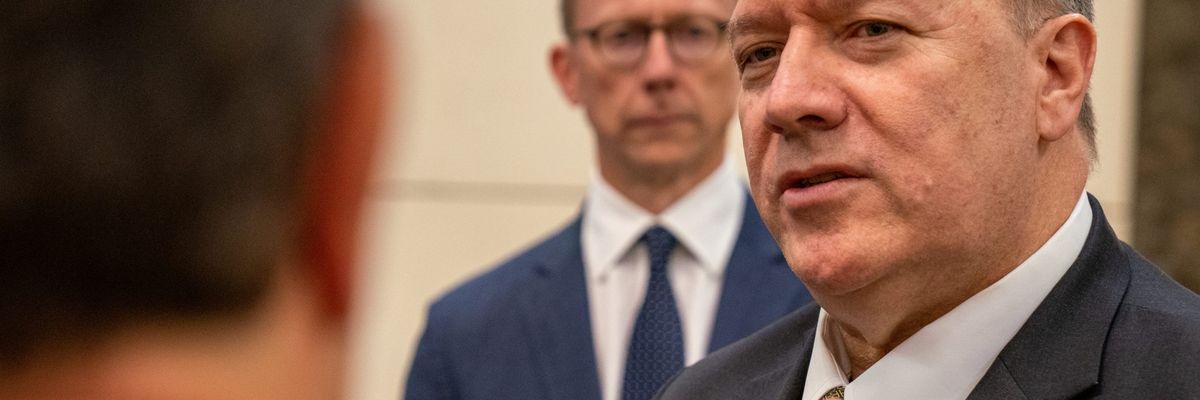The plan reads like a wish list for the U.S. weapons industry and Ukrainian business interests: create a $500 billion “lend-lease” program for Ukraine to buy weapons, “bulk up America’s defense industry” and “swiftly admit Ukraine [to the European Union] and help it modernize and develop its economy.”
Those recommendations came from a board member of a major Ukrainian telecom company and the managing director of a D.C. lobby shop that counts a member of Ukraine’s parliament, an adviser to Ukrainian President Volodymyr Zelenskyy, and the second largest weapons firm in the world, as clients.
But the plan, as presented in a Wall Street Journal op-ed last Thursday, wasn’t marketed as a lobbyist’s work for U.S. and Ukrainian companies, and the authors’ potential conflicts of interest weren’t disclosed. The board member of the Ukrainian telecom company, Kyivstar, was simply identified as “Mike Pompeo,” “Secretary of State, 2018-21.” And the lobbyist was identified as “David J. Urban,” “managing director at the BGR Group and of counsel at Torridon Law.”
The plan itself was presented as a “Trump Peace Plan for Ukraine,” though it is not clear whether Pompeo and Urban are speaking for trump or whether the former president has even seen their “plan.”
Meanwhile, the Journal chose not to make readers aware of Pompeo and Urban’s interests in the policies they were proposing — but public records and press releases provide ample documentation.
“I proudly join VEON and Kyivstar in their extraordinary service to the people of Ukraine by providing essential connectivity and digital services in health, education, business growth and entertainment. I also applaud Kyivstar’s parent company VEON for its leadership in investing in Ukraine with their own long-term commitment and their ‘Invest in Ukraine NOW!’ initiative,” said Pompeo in a November 14, 2023, press release announcing his new role as a board member at Kyivstar.
“It is through private enterprise and investments that Ukraine will secure its economic future and success, and I look forward to contributing to this laudable effort,” he added.
E.U. membership would almost certainly benefit Kyivstar and its shareholders, whose interests Pompeo is entrusted to protect.
Urban’s firm, BGR, registered as an agent for two foreign principals based in Ukraine in May 2022, providing pro-bono representation for Vadym Ivchenko, a member of Ukraine’s parliament, and Elena Lipkivska Ergul, an adviser to Ukraine’s president Volodymyr Zelenskiy.
BGR also has received a $120,000 contract this year to lobby on behalf of RTX (formerly known as Raytheon), the second largest weapons company in the world and whose CEO, Greg Hayes, promised investors in 2022 that “tensions in Eastern Europe,” among other hotpots, would provide significant upside for the company. “So I fully expect we’re going to see some benefit from it,” he said. Raytheon paid BGR $240,000 last year and Lockheed Martin, the largest weapons firm, paid the firm $70,000.
The Journal did not respond to a request for comment about whether they were aware of Urban and Pompeo’s potential conflicts of interest and, if so, why they chose to withhold this information from readers.
- New poll shows people distrust think tanks even more than media ›
- Big mouths for weapons spending are mum on industry backers ›
- Bloomberg didn't disclose potential conflicts in defense columns ›
- Pompeo to advise Ukraine weapons company accused of corruption | Responsible Statecraft ›
















